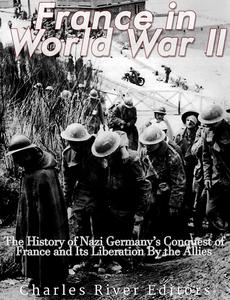
Free Download France in World War II: The History of Nazi Germany's Conquest of France and Its Liberation By the Allies by Charles River Editors
English | February 27, 2017 | ISBN: N/A | ASIN: B06XN5C3KC | 321 pages | EPUB | 5.74 Mb
*Includes pictures
*Includes accounts of the war
*Includes online resources and a bibliography for further reading
*Includes a table of contents
One of the most famous people in the world came to tour the city of Paris for the first time on June 28, 1940. Over the next three hours, he rode through the city's streets, stopping to tour L'Opйra Paris. He rode down the Champs-Йlysйes toward the Trocadero and the Eiffel Tower, where he had his picture taken. After passing through the Arc de Triomphe, he toured the Pantheon and old medieval churches, though he did not manage to see the Louvre or the Palace of Justice. Heading back to the airport, he told his staff, "It was the dream of my life to be permitted to see Paris. I cannot say how happy I am to have that dream fulfilled today." Four years after his tour, Adolf Hitler would order the city's garrison commander, General Dietrich von Choltitz, to destroy Paris, warning his subordinate that the city "must not fall into the enemy's hand except lying in complete debris."
Of course, Paris was not destroyed before the Allies liberated it, but it would take more than 4 years for them to wrest control of France from Nazi Germany after they took the country by storm in about a month in 1940. That said, it's widely overlooked today given how history played out that as the power of Nazi Germany grew alarmingly during the 1930s, the French sought means to defend their territory against the rising menace of the Thousand-Year Reich. As architects of the most punitive measures in the Treaty of Versailles following World War I, France was a natural target for Teutonic retribution, so the Maginot Line, a series of interconnected strongpoints and fortifications running along much of France's eastern border, helped allay French fears of invasion.
Emerging from France's catastrophic 1940 defeat like a bedraggled and rather sinister phoenix, the French State - better known to history as "Vichy France" or the "Vichy Regime" after its spa-town capital - stands in history as a unique and bizarre creation of German Fuhrer Adolf Hitler's European conquests. A patchwork of paradoxes and contradictions, the Vichy Regime maintained a quasi-independent French nation for some time after the Third Reich invasion until the Germans decided to include it in their occupation zone.
By the end of D-Day, June 6, 1944, the Allies had managed to successfully land 170,000 men, with over 75,000 on the British and Canadian beaches, 57,000 on the American beaches, and over 24,000 airborne troops. Thanks to Allied deception, the German army had failed to react to prevent the Allies from making the most of their landings. Just one division, the Hitlerjugend, would arrive the following day. Despite a fearsome and bloody day, the majority of the Allied forces had held their nerve, and most importantly, achieved their objectives. This ensured Operation Overlord was ultimately successful, and victory in Europe would be achieved within less than a year.
Given how the rest of the war played out, it's often forgotten that the British and Americans, after breaking out from their D-Day beachhead on the continent, did not free Paris from its Third Reich garrison. Instead, it was the people of Paris themselves, encouraged by the Allied armies putting the Germans to rout nearby, who retook the city, led by figures from the French Resistance. The revolt that emerged involved many factions, chiefly the followers of Charles de Gaulle, or the "Gaullists," and the communists of the PCF (Parti Communiste Francais, French Communist Party). These factions provided the spearhead and the catalyst sparking the people of Paris into rebellion against their Nazi masters, and the leadership coordinating that uprising and making it a success. Their rivalry and thirst for power spurred them on to outdo each other, but they all sought the same objective: defeat of the foreign occupiers.
